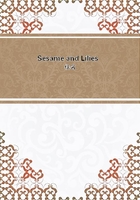
第20章
I put aside his merely romantic prose writings as of no value, and though the early romantic poetry is very beautiful, its testimony is of no weight, other than that of a boy's ideal. But his true works, studied from Scottish life, bear a true witness; and in the whole range of these, there are but three men who reach the heroic type--Dandie Dinmont, Rob Roy, and Claverhouse; of these, one is a border farmer; another a freebooter; the third a soldier in a bad cause. And these touch the ideal of heroism only in their courage and faith, together with a strong, but uncultivated, or mistakenly applied, intellectual power; while his younger men are the gentlemanly play-things of fantastic fortune, and only by aid (or accident) of that fortune, survive, not vanquish, the trials they involuntarily sustain. Of any disciplined, or consistent character, earnest in a purpose wisely conceived, or dealing with forms of hostile evil, definitely challenged and resolutely subdued, there is no trace in his conceptions of young men. Whereas in his imaginations of women,--in the characters of Ellen Douglas, of Flora MacIvor, Rose Bradwardine, Catherine Seyton, Diana Vernon, Lilias Redgauntlet, Alice Bridgenorth, Alice Lee, and Jeanie Deans,--with endless varieties of grace, tenderness, and intellectual power, we find in all a quite infallible sense of dignity and justice; a fearless, instant, and untiring self-sacrifice, to even the appearance of duty, much more to its real claims; and, finally, a patient wisdom of deeply-restrained affection, which does infinitely more than protect its objects from a momentary error; it gradually forms, animates, and exalts the characters of the unworthy lovers, until, at the close of the tale, we are just able, and no more, to take patience in hearing of their unmerited success.
So that, in all cases, with Scott as with Shakespeare, it is the woman who watches over, teaches, and guides the youth; it is never, by any chance, the youth who watches over, or educates, his mistress.
Next take, though more briefly, graver testimony--that of the great Italians and Greeks. You know well the plan of Dante's great poem--that it is a love-poem to his dead lady; a song of praise for her watch over his soul. Stooping only to pity, never to love, she yet saves him from destruction--saves him from hell. He is going eternally astray in despair; she comes down from heaven to his help, and throughout the ascents of Paradise is his teacher, interpreting for him the most difficult truths, divine and human; and leading him, with rebuke upon rebuke, from star to star.
I do not insist upon Dante's conception; if I began I could not cease: besides, you might think this a wild imagination of one poet's heart. So I will rather read to you a few verses of the deliberate writing of a knight of Pisa to his living lady, wholly characteristic of the feeling of all the noblest men of the thirteenth, or early fourteenth, century, preserved among many other such records of knightly honour and love, which Dante Rossetti has gathered for us from among the early Italian poets.
"For lo! thy law is passed That this my love should manifestly be To serve and honour thee:
And so I do; and my delight is full, Accepted for the servant of thy rule.
"Without almost, I am all rapturous, Since thus my will was set To serve, thou flower of joy, thine excellence:
Nor ever seems it anything could rouse A pain or a regret.
But on thee dwells my every thought and sense;Considering that from thee all virtues spread As from a fountain head,--THAT IN THY GIFT IS WISDOM'S BEST AVAIL, AND HONOUR WITHOUT FAIL, With whom each sovereign good dwells separate, Fulfilling the perfection of thy state.
"Lady, since I conceived Thy pleasurable aspect in my heart, MY LIFE HAS BEEN APARTIN SHINING BRIGHTNESS AND THE PLACE OF TRUTH;Which till that time, good sooth, Groped among shadows in a darken'd place, Where many hours and days It hardly ever had remember'd good.
But now my servitude Is thine, and I am full of joy and rest.
A man from a wild beast Thou madest me, since for thy love I lived."You may think perhaps a Greek knight would have had a lower estimate of women than this Christian lover. His spiritual subjection to them was indeed not so absolute; but as regards their own personal character, it was only because you could not have followed me so easily, that I did not take the Greek women instead of Shakespeare's; and instance, for chief ideal types of human beauty and faith, the simple mother's and wife's heart of Andromache; the divine, yet rejected wisdom of Cassandra; the playful kindness and simple princess-life of happy Nausicaa; the housewifely calm of that of Penelope, with its watch upon the sea; the ever patient, fearless, hopelessly devoted piety of the sister, and daughter, in Antigone; the bowing down of Iphigenia, lamb-like and silent; and finally, the expectation of the resurrection, made clear to the soul of the Greeks in the return from her grave of that Alcestis, who, to save her husband, had passed calmly through the bitterness of death.